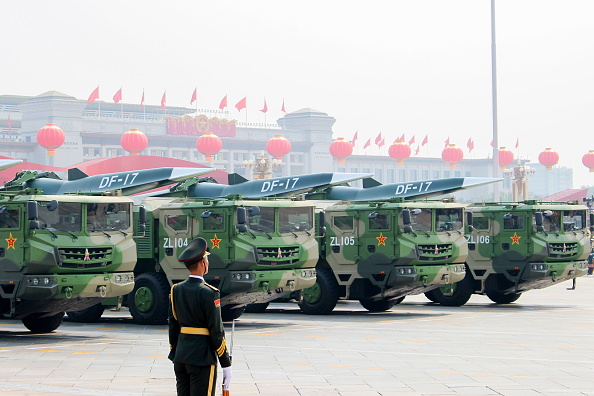China on Thursday attempted to dismiss U.S. concerns surrounding its launch of a hypersonic missile by describing it as “routine” and alleging the U.S. has concocted China as an “imaginary enemy.”
Gen. Mark Milley on Wednesday became the first Pentagon official to confirm reports that China launched a high-speed missile capable of evading U.S. defense systems by orbiting the Earth July 27.
The chairman of the Joint Chiefs of Staff called the launch “very concerning.”
Chairman of the Joint Chiefs of Staff Gen. Mark A. Milley testifies during a House Armed Services Committee hearing on ending the U.S.military mission in Afghanistan in the Rayburn House Office Building at the U.S. Capitol on Sept. 29, 2021 in Washington, D.C.
(Photo by Rod Lamkey-Pool/Getty Images)
MILLEY: CHINA’S REPORTED HYPERSONIC TEST ‘VERY CONCERNING’ AND CLOSE TO A ‘SPUTNIK MOMENT’
Chinese spokesman Wang Webin downplayed the severity of threat this missile system poses to the world, telling reporters it was a “routine test of spacecraft.”
But Heino Klinck, former deputy assistant secretary of defense for East Asia under the Trump administration, told Fox News this pretext is categorically inaccurate, given the rare nature of the missile technology.
“They are not common. It’s an emerging technology,” Klinck said. “There is no military that has yet fielded hypersonic weapons anywhere in the world.”
Wang on Thursday accused the U.S. of propelling an arms race by conducting “frequent tests of hypersonic weapons and all forms of intercontinental ballistic missiles,” a competition Milley accused China of fueling.
Milley likened China’s missile test to the 1957 launch of Sputnik by the Soviet Union, which sparked a decades-long space race. Milley’s comment suggested China could spark its own arms race.
Chairman of the Joint Chiefs of Staff Gen. Mark A. Milley testifies during a House Armed Services Committee hearing on ending the U.S. military mission in Afghanistan in the Rayburn House Office Building at the U.S. Capitol on Sept. 29, 2021 in Washington, D.C.
(Photo by Rod Lamkey-Pool/Getty Images)
“We’re already in an arms race.” Klinck, who also served as a State Department military attache in China, told Fox News.
CAN THE US DEFEND AGAINST CHINESE MISSILE ATTACK?
“I think all of Asia finds itself arming defensively in light of the capabilities that the PLA [People’s Liberation Army] has been amassing over the last many years.
“I believe that the United States needs to make the appropriate investments in defense in order to strengthen deterrence,” he added, reflecting on Ronald Regan’s Cold War strategy of “peace through strength.”
China has repeatedly denied any wrongdoing as it ramps up military aggression in the Indo-Pacific and has condemned U.S. backing of Taiwan defenses.
DF-17 Dongfeng medium-range ballistic missiles equipped with a DF-ZF hypersonic glide vehicle roll in a military parade to mark the 70th anniversary of the Chinese People’s Republic in Beijing, China, in October 2019.
(Photo by Zoya RusinovaTASS via Getty Images)
Taiwan identifies as a sovereign nation, but it is officially recognized by China, the United Nations and the U.S. as part of the communist nation under the one-China policy.
China has repeatedly condemned Taiwanese independence and has said it will take the island back by force, a threat U.S. security officials have warned could happen within the next six years.
CLICK HERE TO GET THE FOX NEWS APP
“I judge the Chinese through their actions,” Klinck said. “In addition to the significant increase in Chinese defense expenditures and the historic modernization of the PLA, Chinese demonstrable intent has been seen in its assertive and aggressive action – most pronounced vis-a-vis Taiwan, but also in other parts of the world.”
The former deputy assistant secretary of defense urged the Biden administration to increase deterrence by working with not just regional allies, but global partners as well to take on China.
Andrew Mark Miller contributed to this report.




